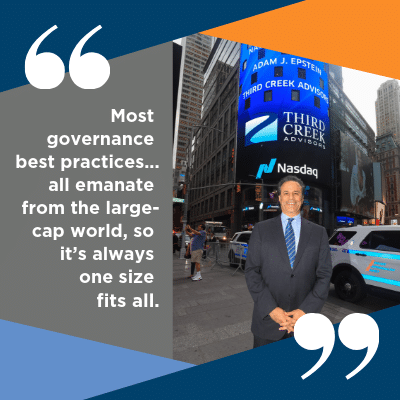Adam J. Epstein has a wide-ranging (and sometimes lighthearted) discussion with BoardProspects CEO, Mark Rogers.
On book writing, catch phrases, and musical preferences
BP: I think most people probably know that you were an institutional investor, and that your firm Third Creek Advisors, LLC advises lots of boards, but some might not know that you wrote a corporate governance book that made it to #1 in its vertical on Amazon. For those of us who’ve not written a book – but might – what are three things we should keep in mind to reach #1?
AJE: I was listening to Paul McCartney talk about songwriting a few weeks ago, and he said that he never really wrote a song to be a hit, rather he wrote the kind of songs he likes to listen to. In a way, I think writing books is the same thing, Mark. I wrote The Perfect Corporate Board, because I wished a resource like it existed when I was a CEO, and an investor, and a board member. Three things, eh?
OK, here’s my three: (1) make sure you get the introduction right, because most people don’t continue reading when the beginning of a book is crummy; (2) if you can say it in 10 words, you can also probably say it in seven; and (3) find a great editor, and do whatever they tell you.
BP: Even people who might not know you, have probably heard your catchphrase that “better governed companies… make more money.” Where did that come from?
AJE: When I first started advising boards, I had dinner with a CEO who was pretty dismissive of the value of boards. When we were leaving the restaurant he said, “Adam, I frankly just feel like it’s a form-over-substance waste of time.” I asked him, somewhat rhetorically: “So the folks who manage trillions of dollars – BlackRock, State Street, Fidelity, etc. – you reckon they are laser-focused on the boardrooms of their portfolio companies because they think it’s, what, academically interesting? These are the most capitalistic entities on the planet; they are hell-bent on corporate governance, because they know – 100 percent – that better governed companies make more money.” It wasn’t an auspicious start to the catchphrase though… they didn’t hire my firm!
 BP: I can’t let the McCartney reference go by without asking: Beatles or Stones?
BP: I can’t let the McCartney reference go by without asking: Beatles or Stones?
AJE: Let the record reflect that there was no hesitation in the answer: Beatles. Though I was born in the U.S., I actually grew up about 200 yards away from the Abbey Road crosswalk. But there is absolutely no truth to the myth that I have a stolen Abbey Road street sign hanging in my office. To the best of my knowledge, it’s on “extended loan” from the St. John’s Wood town council.
On activism, CEO mistakes, and Supreme Court justices
BP: Since you’re a former institutional investor, and also a governance expert, is it accurate to assume that you’re a proponent of shareholder activism?
AJE: No. I’m a proponent of being an informed, involved shareholder. However, I’m not a fan of 85% of those who refer to themselves as activists, many of whom are just arbitrageurs who’ve opportunistically re-branded themselves to garner more assets to manage. Like a lot of things in life, there are a tiny percentage who are really good at what they do. There are activists who are incredibly astute, long-term biased, change agents who have extensive, successful experience in operational and governance optimization. Frankly, some of the best ones are the quietest ones, and are welcomed(-ish) by CEOs and boards when they show up. And, then, there are the majority of so-called activists who believe that every company should be sold immediately – never mind to whom, by the way – or they believe that simply shouting and sending mean-spirited letters is actually an investment modality.
 BP: What are the three biggest mistakes that CEOs make when they speak directly with institutional investors?
BP: What are the three biggest mistakes that CEOs make when they speak directly with institutional investors?
AJE: It’s pretty hard to limit it to three, but I’ll do my best: (1) don’t ever meet with an institutional investor without knowing as much as humanly possible about the portfolio manager you’re meeting with, the fund, their investments, and, if possible, how the fund is performing YTD; (2) don’t be long-winded – brevity actually inspires more confidence; and (3) it’s better to say “I don’t know, but I’ll get back to you,” than it is to speculate. Honorable mentions: don’t be late, don’t dress informally, and don’t read PowerPoint slides to investors – they might not be as smart as you, but they can definitely read.
BP: You and I have law school in common; favorite Supreme Court justice?
AJE: Oliver Wendell Holmes. Not even a close call…
On things you don’t realize, SOGs, and having a fantastic job
BP: Since you started sitting on boards and advising them after your tenure as an institutional investor, what didn’t you understand about board service when you were an investor?
AJE: That’s a great question, Mark. I know this is perhaps going to sound trite, but I didn’t realize how hard it is. In fact, at the risk of being presumptuous, I’m pretty sure most institutional investors don’t realize how hard it is. By the time questions make it to boards of public companies, they are all hard questions. And the answers affect a humbling continuum of stakeholders.
BP: You’ve been pretty outspoken about the need for all public companies to have stock ownership guidelines for board members. Why?
AJE: Well, I’m glad you asked that, because I’m not sure people always understand the answer. I’m not opposed to directors being well compensated for their jobs; as we just discussed, it’s a hard job, and it’s a risky job. But what I saw over many years as an investor, is that there are too many board members with day-to-day conflicts of interest. What I mean by that is that they rely on cash board stipends to pay for their living expenses. Are you really going to step off a board you know you aren’t contributing to, if it’s paying for your annual vacations in retirement? Maybe. But maybe not. Board members just act differently – and in a way that’s more aligned with shareholders – when they have to take a meaningful amount of cash out of their pockets and buy stock.
BP: In addition to advising boards, and writing about governance and capital markets, you’re also a professional speaker. What’s the most common misperception about speaking for a living?
 AJE: I think it’s increasingly the case in our “instant gratification” world today for people to wildly underestimate the amount of time and effort it takes to excel at anything. And speaking is definitely no exception. When I tell people that there’s often well more than an hour of work that goes into every minute of speaking, they always have the same perplexed look on their faces. I’ve spoken more than 100 times the last several years, and I’ll tell you… it’s really hard work, it’s humbling work, and it’s also pretty tiring, because virtually every speaking engagement seems to require a hopelessly delayed plane flight as well. All that said, it’s a fantastic job, because it’s a constantly challenging privilege to speak to really smart people.
AJE: I think it’s increasingly the case in our “instant gratification” world today for people to wildly underestimate the amount of time and effort it takes to excel at anything. And speaking is definitely no exception. When I tell people that there’s often well more than an hour of work that goes into every minute of speaking, they always have the same perplexed look on their faces. I’ve spoken more than 100 times the last several years, and I’ll tell you… it’s really hard work, it’s humbling work, and it’s also pretty tiring, because virtually every speaking engagement seems to require a hopelessly delayed plane flight as well. All that said, it’s a fantastic job, because it’s a constantly challenging privilege to speak to really smart people.
On best practices, great character traits, and a few surprises
BP: I watched a segment of you filmed in Nasdaq’s Times Square headquarters, where you talked about some intriguing, cost-effective boardroom best practices plied by smaller public companies. Being a director of a small-cap company seems like a pretty different job than being on the board of a large-cap company?
AJE: I heard someone say one time that if being on a large-cap board is like staying at the Four Seasons, then being on the board of a small-cap company is more like camping. Truer words have never been spoken. It’s a shame, frankly, that so many so-called corporate governance “experts” fail to even acknowledge the dramatic differences between governing different sized entities. For better or for worse, most governance best practices and scholarships all emanate from the large-cap world, so it’s always one-size-fits-all. But you could literally ask a roomful of seventh graders, Mark, whether operating a business with 20,000 employees is the same thing as running a company with 20 people, and 100 percent of them will, of course, answer “no.” Well, if running them can’t possibly be the same thing, how can governing them be the same thing?
 BP: I’m going to put you on the spot, and ask you whether there’s one character trait that most great board members seem to have in your experience?
BP: I’m going to put you on the spot, and ask you whether there’s one character trait that most great board members seem to have in your experience?
AJE: Absolutely. If you assume the requisite expertise, the most important attribute by a country mile is: courage. You can have an absolute who’s who of experts in a boardroom, and there will inevitably be underperformance or failure if any of them lack the courage to speak up. Courage means asking the CEO to explain something to you again – for the fourth time – despite other board members all becoming irritated with you. Courage means exercising fierce objectivity, especially when there is pressure to do the opposite. Courage means realizing that you’re on a board to look out for shareholders who aren’t in the room with you – shareholders who might only own 100 shares – rather than to get along with the other board members. Courage is hard.
BP: What are three things people would be surprised to know about you?
AJE: Let’s see: (1) I’ve been climbing up wilderness peaks and skiing down them for 30 years; (2) I play the drums in mostly forgettable garage bands; and (3) I broke my iPad last weekend during a(nother) miserably failed attempt to solve the Saturday NYT crossword puzzle.
View Adam’s new webinar “Five Blunt Reasons Your Board Search Has Been Unsuccessful” in BoardProspects’ BoardU.
________________



